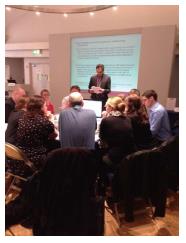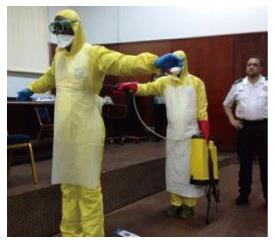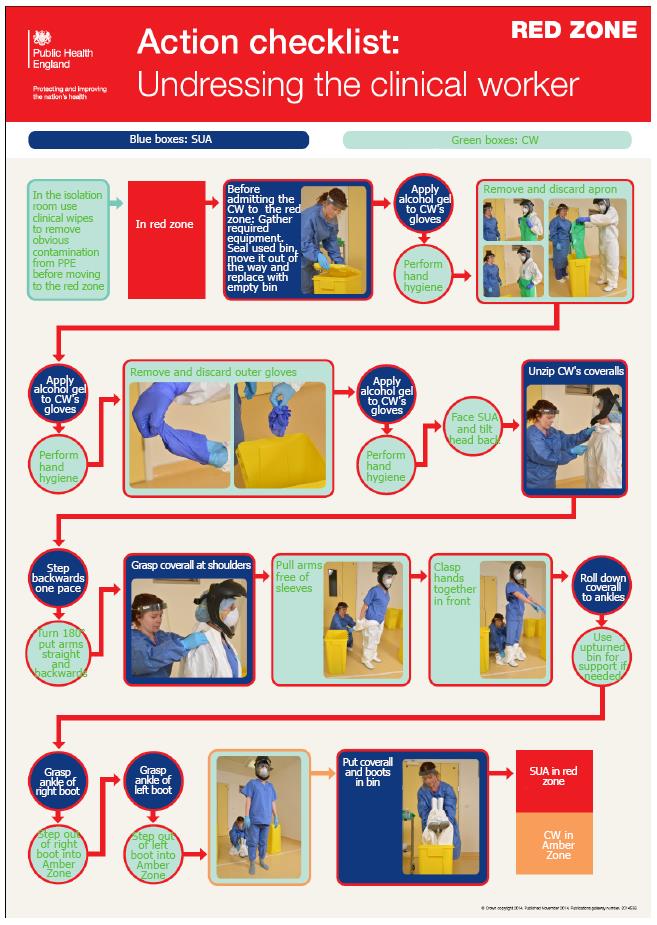Published online Feb 25, 2016. doi: 10.5495/wjcid.v6.i1.1
Peer-review started: May 30, 2015
First decision: August 14, 2015
Revised: September 25, 2015
Accepted: December 9, 2015
Article in press: December 11, 2015
Published online: February 25, 2016
Processing time: 273 Days and 1.1 Hours
In response to the outbreak of Ebola Virus Disease in West Africa, the Emergency Response Department of Public Health England produced a series of training and exercising materials to help prepare health and partner organisations in England and other jurisdictions in the United Kingdom deal with a possible case of Ebola in the United Kingdom. They were produced with input from health (NHS England, Health Protection Scotland, Public Health Wales) and other partner organisations. The exercising materials have been used by colleagues working in national and local level organisations in the United Kingdom and other countries in the European Union. Presented here is a description of these training and exercising materials and how they were delivered to the end user.
Core tip: This review summarises the public health training and exercising materials produced by Public Health England and used by national and local health responders to prepare for a case of Ebola Virus Disease in the United Kingdom. It describes the different training and exercise materials developed, how they were used and how they were delivered to their target audiences.
- Citation: Black AD, Moulsdale HJ, Evans MR, Simpson JL. National preparedness training and exercises for Ebola cases in the United Kingdom. World J Clin Infect Dis 2016; 6(1): 1-5
- URL: https://www.wjgnet.com/2220-3176/full/v6/i1/1.htm
- DOI: https://dx.doi.org/10.5495/wjcid.v6.i1.1
Public Health England (PHE) is a United Kingdom public sector body that combines elements of public health including health protection, science, research, emergency response, planning and training. The Emergency Response Department (ERD) of PHE has considerable experience in the development of a wide range of training and exercises to develop preparedness in the health community, government departments and other multi-agency partners in the United Kingdom and Europe. During the outbreak of Ebola in West Africa, PHE developed guidance to help health providers prepare for an imported case in the United Kingdom. To date there have been 3 imported cases of confirmed Ebola in the United Kingdom. The training and exercises produced by ERD were based on the PHE guidance and were developed with advice and assistance from colleagues from the Royal College of General Practitioners, the Health and Safety Executive and the NHS Ambulance Service’s National Ambulance Resilience Unit.
An exercise is a simulation of an emergency situation used to validate plans, test well established procedures, develop staff competencies and give them practice in carrying out their roles during an emergency[1]. At the request of the Department of Health, ERD developed a series of exercises for responders working at local, regional and national levels as part of their preparedness for dealing with an imported case of Ebola.
ERD developed an “off-the-shelf” exercise package to be used by the 38 multi-agency Local Resilience Forums (LRF) in England during October and November 2014. These Forums are where local responders plan, prepare, exercise and communicate in a local environment[2]. The same exercise pack was offered to each of the LRFs[3] which allowed emergency planning staff to run their own exercise using material developed by PHE. This method of exercise delivery allows a number of exercises to be run concurrently or within a short time frame.
The “off-the-shelf” exercise was designed to be used by health professionals, port staff and multi-agency partners over a period of 4 h. The exercise package contains an explanation of how to manage, run and evaluate the exercise along with a scenario, questions for the participants and specialist information about the disease to help the exercise facilitator to guide participants. This exercise was designed to be run as a discussion-based exercise providing participants with an opportunity to develop awareness of their existing plans[4]. The exercise is divided into 3 sessions each starting with a short scenario followed by questions for the participants to discuss. The exercise asks participants to consider their actions in dealing with a suspected, then confirmed, case of Ebola at: A port of entry; the emergency department of an acute hospital Trust and then the transfer of that patient to a high level isolation unit within the United Kingdom.
All 38 Local Resilience Forums in England carried out the exercise. A report on these exercises was collated by PHE and the national Department of Communities and Local Government responsible for the LRFs. An international version of this exercise using similar scenarios and question sets has been developed and issued to colleagues from 13 European countries.
Three exercises were developed and run for the United Kingdom health authorities between October 2014 and March 2015.
In October 2014 ERD, working with colleagues from the national Department of Health and the Civil Contingencies Committee, coordinated the delivery of an eight hour national exercise designed to test preparedness and response to Ebola cases in the United Kingdom[5]. There were two live elements of the exercise which took place in Gateshead (Northern England) and Hillingdon (part of London) which involved actors playing the part of patients with Ebola Virus Disease (EVD) being treated by paramedics and hospital staff. Information from these separate “live play” incidents was fed to the United Kingdom government’s national level crisis decision making process, commonly referred to as Cabinet Office Briefing Room[6].
A second, similar exercise was held in December 2014, involving representatives from the four countries of the United Kingdom (England, Scotland, Wales and Northern Ireland). This table-top exercise explored how health authorities in those countries would work together to deal with imported Ebola cases identified in each of the 3 countries outside England. The exercise was run using teleconference facilities from each of the health authorities in their respective countries.
In March 2015 ERD ran a discussion-based exercise in London to consider surge arrangements for the nominated NHS EVD (high containment) specialist treatment centres in the United Kingdom which were set aside for accepting Ebola cases. The exercise involved participants from the Department of Health, Public Health England, NHS England, the Ambulance service and the Health and Safety Executive. The exercise was divided into two sessions. The first of these sessions examined the response to six cases, enough to overwhelm the specialist centres for the treatment of Ebola patients. The second considered the response of primary care providers where there were multiple unconfirmed cases in different communities across England (Figure 1).
As well as these exercises run in the United Kingdom, ERD has also been working with colleagues from the Royal Institute of International Affairs, Chatham House - an independent policy institute which engages governments, the private sector, civil society and its members in open debate and confidential discussion on the most significant developments in international affairs[7] - as part of their Infectious Diseases Risk Assessment and Management initiative. This included exercises to allow those working in the extractive (mining, oil and gas) industries to gain experience of the risks associated with outbreaks of infectious disease[7]. ERD’s contribution has been to develop and run a series of exercises called Exercise Kulinda Afya (Swahili for “protect our health”) as a method for representatives from the extractive industry, international development and governments to discuss together their response to an outbreak of Viral Haemorrhagic Fever. This discussion based exercise has been run with support from USAID with colleagues in the Democratic Republic of Congo and at extractive industry conferences in Australia and London. More are planned and this programme will continue into 2015.
In early 2015 staff from PHE and the NHS Ambulance service’s National Ambulance Resilience Unit were invited by the Ministries of Health in Cameroon and Côte d’Ivoire and the United States Centers for Disease Control and Prevention to deliver Ebola preparedness workshops in these two West African countries. These week-long workshops were designed to practice participants in different aspects of national level and multi-sectorial coordination of response to EVD including: Establishment of the emergency operation centre; rapid response team’s competencies and skills; outbreak control, particularly epidemiological surveillance and contact tracing; infection prevention and control and the use of personal protective equipment. A picture of staff during Personal Protective Equipment (PPE) training is at Figure 2. These exercises also included patient and sample transport and laboratory capability testing.
PHE was requested by the national Department of Health to provide training and training materials for health workers in England to deal with suspected cases of Ebola and provide familiarisation with guidance.
ERD and the NHS Ambulance service’s National Ambulance Resilience Unit delivered training to 277 NHS Emergency Department staff from 114 of the 155[8] acute Trusts in England in the first half of December 2014. This training taught the safe donning and doffing of one particular combination of PPE when dealing with a patient with suspected Ebola. The training was based on guidance produced by the United Kingdom Government Advisory Committee on Dangerous Pathogens which advises the Health and Safety Executive, and Ministers for the Department of Health and the Department for the Environment, Food and Rural Affairs and their counterparts under devolution in Scotland, Wales and Northern Ireland, as required, on all aspects of hazards and risks to workers and others from exposure to pathogens[9]. The committee’s guidance on Management of Hazard Group 4 Viral Haemorrhagic fevers and similar human infectious diseases of high consequence[10] formed the basis for standard operating procedures developed by PHE staff.
The training materials included a video describing a step-by-step guide to the PPE donning and doffing procedure and the possible infection routes for Ebola to inform safe methods of working. Four A1 posters were also produced, which emergency department staff could use to help guide them through the procedures. An example of the posters showing emergency department staff the procedure for donning and doffing of PPE is shown in Figure 3. The films and posters were distributed to each person attending the training and those staff who have attended the training are able to access the materials through Public Health England’s e-learning website[11]. Training and templates for the preparation of training materials have also been provided to NHS Wales.
A video based on the PHE guidance Information for Primary Care: Managing patients who require assessment for Ebola virus disease[11] and action cards produced by the Royal College of General Practitioners[11] was produced as an additional training tool for staff working in a primary care setting. The video describes the response to a suspected case of Ebola self-presenting at a doctor's surgery and describes the steps that can be taken by each member of the general practice staff to ensure that the patient is treated safely and quickly. The 20 min video takes the viewer through various scenarios, describing the different ways a patient might come into contact with primary health care providers and the actions detailed in the guidance. There are over 7900 General Practitioner practices in England[11] the video was posted on You Tube to make it as accessible as possible.
A third element of training was delivered to staff at ports of entry in England and was based on PHE internal guidance. The training describes the questionnaire and procedures to be used when screening passengers entering or returning to the United Kingdom from the Ebola affected countries in West Africa. The training was carried out with support from colleagues from local health protection teams across England.
These training and exercising materials are an important element in the preparation for the health service and other national and local responders across the United Kingdom.
Feedback confirmed that the exercises and training were valuable tools in ensuring that organisations and individual staff were familiar with the procedures to be followed in the event of a case of EVD into the United Kingdom. They helped familiarise participating organisations with each other’s preparedness plans and practices, and promoted better understanding and cooperation between responding organisations. They fostered discussion, proposed realistic actions and identified important issues and areas for development. The lessons identified from all the events have been reported and allocated to the relevant organisations (a large percentage have been actioned) and in a generic form will be used to assist with future response planning for infectious diseases.
We thank representatives from the following organisations for their contribution to the training and exercises: Australia-Africa Mining Industry Group, Health and Safety Executive, Health Protection Scotland, International SOS, Ministry of Public Health Cameroon, National Institute of Public Health Côte d’Ivoire, NHS England, NHS England National Ambulance Resilience Unit, Northern Ireland Department of Health Social Services and Public Safety, Paydirt Media, Public Health England, Public Health Wales, Royal College of General Practitioners, Royal Institute of International Affairs Chatham House, United Kingdom Department of Health, United States Centers for Disease Control and Prevention, United States Agency for International Development.
P- Reviewer: Krishnan T S- Editor: Qiu S L- Editor: A E- Editor: Lu YJ
| 1. | Available from: http//www.gov.uk/guidance/emergency-planning-and-preparedness-exercises-and-training. |
| 2. | Available from: http//www.gov.uk/government/uploads/system/uploads/attachment_data/file/62277/The_role_of_Local_Resilience_Forums_A_reference_document_v2_July_2013.pdf. |
| 3. | Available from: http//www.gov.uk/local-resilience-forums-contact-details#england. |
| 4. | Available from: http//www.gov.uk/emergency-planning-and-preparedness-exercises-and-training#emergency-planning-exercises. |
| 5. | Available from: http//www.gov.uk/government/news/exercise-to-test-preparedness-for-a-case-of-ebola-in-the-uk. |
| 6. | Available from: http//www.gov.uk/government/news/national-ebola-exercise-concludes. |
| 7. | Available from: http//www.chathamhouse.org/about/structure/global-health-security/extraction-industry-infectious-disease-risk-assessment-and-management-idram-project. |
| 8. | Available from: http//www.nhsconfed.org/resources/key-statistics-on-the-nhs. |
| 9. | Available from: http//www.hse.gov.uk/aboutus/meetings/committees/acdp/. |
| 10. | Department of Health and Health and Safety Executive. Management of Hazard Group 4 viral haemorrhagic fevers and similar human infectious diseases of high consequence. Available from: http//www.gov.uk/government/publications/viral-haemorrhagic-fever-algorithm-and-guidance-on-management-of-patients. |
| 11. | Health and Social Care Information Centre. General and Personal Medical Services. Available from: http//www.hscic.gov.uk/catalogue/PUB13849. |











